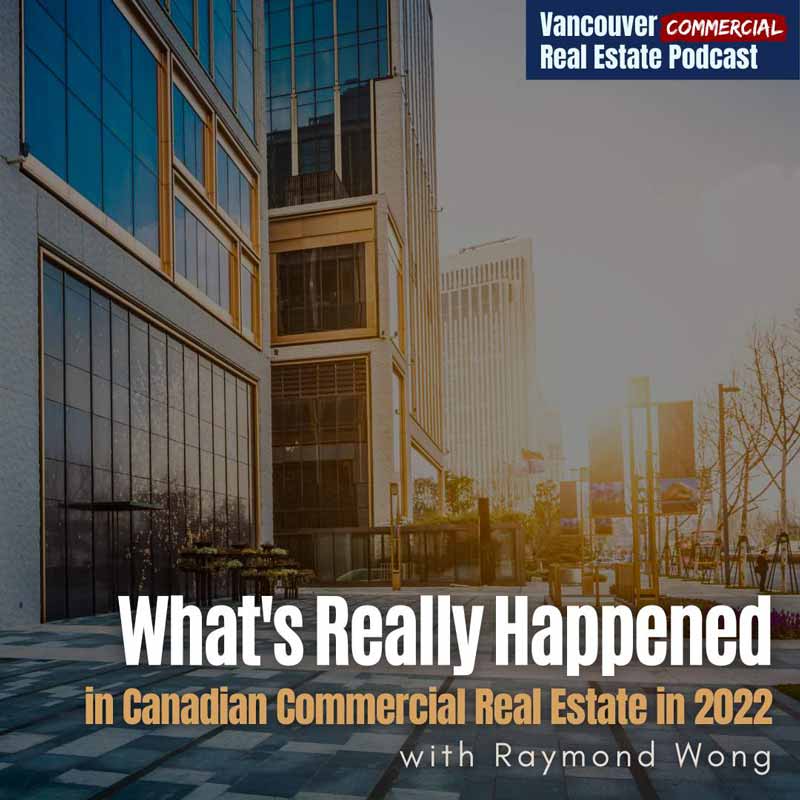
Powered by RedCircle
Want to hear from the man who plausibly has more data on commercial real estate than anyone in Canada?
In the studio this week, Matt and Rod (Cory didn't survive the William Wright Whistler weekend) welcome Raymond Wong, Vice President, Data Operations of Altus Group, to look behind the numbers on what has happened across Canada in 2022.
Raymond unpacks which asset classes are selling, which are not, and what is set to rebound. You might be surprised with his answers on which Canadian cities have outperformed their counterparts and which cities are set for a big 2022. Raymond debunks all the myths and unlocks the data only for our VCREP listeners.
What is Altus Group?
Altus Group is a real estate services company. I’m part of the data solutions group looking at commercial and new home data across Canada. We try to make sense of market direction and look at opportunities and trends.
Has the commercial real estate market in the first half of 2022 surprised you?
Yes and no. Comparing Q1 of 2022 to Q4 of 2021, we’re already up 72% in sales volume. That wasn’t surprising, as we were expecting another record year. And a lot of that was activity that happened in 2021 but wasn’t completed until 2022.
With the increase in inflation and interest rates, we’re expecting to see an impact on commercial real estate but we haven’t seen it yet. Cap rates may be increasing but not by much. So I’m waiting for the other shoe to drop.
What is the relationship between residential real estate and commercial real estate?
There is a correlation between residential and commercial real estate. We typically see a lag in commercial real estate as companies adjust their usage or investment strategy that we don’t see as much in residential real estate.
We currently have less than 1% availability in Vancouver for industrial real estate, so it’s hard to imagine a slow down in that market. The lack of supply is a big factor. With the pandemic, we had a rapid slowdown in investments and shuttering of the office market. We didn’t know how the market would be impacted long term.
How do investors feel about the commercial real estate market in 2022?
Every quarter we survey 150 investors across Canada to see where they think the market is going. So far, that survey has shown us investors still have a huge appetite for commercial real estate.
There’s still a lot of capital to spend and a lot of interest in multi-family and industrial real estate. Industrial is driven by the lack of supply and continued demand for ecommerce business. We’re undersupplied for large warehouse space. And multi-family is driven by the constant need for housing.
Will cap rates go up in 2022?
Yes, cap rates should go up based on rising interest rates and borrowing costs. We should see that with industrial, office and retail. We need to see how supply and demand will play out.
If interest rates are higher, it costs more to borrow money. That should impact the sale price going forward.
How does commercial real estate fare through a recession? Which asset classes do well during a recession and which ones are at risk?
I hate to say that industrial real estate is bullet-proof but it almost feels that way. Industrial real estate should fare well through a recession.
We had a housing affordability issue before the increase in interest rates and the increase has just worsened that. So we have potential buyers becoming renters, pushing rental rates higher with the increase in demand. So multi-family should do well through a recession too. People always need to live somewhere.
The grey area would be office space and retail. With more people working from home and companies needing to cut back, office space may be what goes. And with the increase in supply costs and gasoline, the retail sector may be impacted. Just as people were starting to go back to stores and dining, they may have to scale back during a recession. But the retail sector has the ability to pivot, which we saw during covid.
Which markets are doing better in 2022: primary markets, secondary markets or tertiary markets?
To be honest, I don’t know anymore. If you look at interprovincial migration, affordability and the increase in remote work, Atlantic Canada has benefited from people moving back or moving in. But at the same time, a large number of people have moved into BC’s secondary and tertiary markets, where house prices are now up 40-50%. That causes problems for locals who can no longer afford to live there.
That demand in secondary and tertiary markets on the residential side drives the retail market. If you look at Kelowna, you can see the expansion of office space and the UBC campus, which will result in a lot of jobs.
But I am still a strong believer in the big primary markets, like Vancouver and Toronto, and their consistent returns. From an immigration standpoint, most newcomers to Canada want to be in the big cities, so there will always be a demand for residential and commercial real estate.
How have the office and retail sectors recovered through the pandemic?
We can no longer look at the office as just a place to be from 9-5. We need to give people a reason to come into the office. So that might mean more amenities or more collaboration opportunities. And it will take some time to see the impact of that. People are still nervous to get on public transit and go into buildings.
There will be a change to how office and retail are used. We’ll probably see more mixed use properties. But we need more time for people to get comfortable with getting back out into the world. Companies are trying to figure out a hybrid model to meet people where they are.
Has Vancouver bounced back faster than Toronto post-pandemic?
Absolutely. Overall, Vancouver is 9.4% CMA whereas Toronto is close to 16%. We are seeing a quicker recovery in Vancouver. We see a lot of demand for newer and more modern spaces in both Vancouver and Toronto. Both cities have lots of office space under construction and good lease up rates.
Where are the current opportunities in the commercial real estate market?
Industrial is always a good idea. With industrial real estate, you can’t wait and see or else you’ll lose the opportunity. You have to act now. With any opportunity, you need to think about the potential for that site over the next few years. Can you afford to wait? It depends on your risk tolerance.
One of the biggest areas of activity is land acquisition. If you want to make that play, you can pick it up now and know that prices will go up. You have to believe in where you’re buying and believe we’ll get through the next 6-12 months.
Is there a moment in real estate history that feels like today?
We’ve had some bizarre times in Canadian real estate over the last 30+ years. But things feel different now. I don’t think it’s dire but there are a number of negative factors affecting our market like covid, rising cost of construction, the war in Ukraine, etc. So even if our numbers today are similar to numbers in the past, no slowdown is exactly the same.
Learn more: www.altusgroup.com
For all the curious minds interested in commercial real estate investing, grab a coffee and pull up a chair because we have exclusive stories and tips from commercial real estate brokers, investors, developers, economists, urban planners, and everyone in-between. From the successes and failures to the motivations and lessons learned, the Vancouver Commercial Real Estate Podcast is your insight into commercial real estate in Vancouver, Victoria, Kelowna, and beyond.
What's the best real estate market to invest in? What are the commercial real estate asset classes and property types? Hosted by Cory Wright, founder of William Wright Commercial, and co-hosts Adam and Matt Scalena of the Vancouver Real Estate Podcast, our podcast opens the door to real estate investing for everyone from beginner investors to experienced real estate professionals. New episodes are released every Tuesday. Follow the Vancouver Commercial Real Estate Podcast on Apple Podcasts, Spotify, Google Podcasts, or your favourite streaming platforms.

This communication is not intended to cause or induce breach of an existing agency agreement. E&OE: All information contained herein is from sources deemed reliable, and have no reason to doubt its accuracy; however, no guarantee or responsibility is assumed thereof, and it shall not form any part of future contracts. Properties are submitted subject to errors and omissions and all information should be carefully verified. All measurements quoted herein are approximate.
ⓒ William Wright Commercial Real Estate Services 2024
Proudly designed by Burst Creative